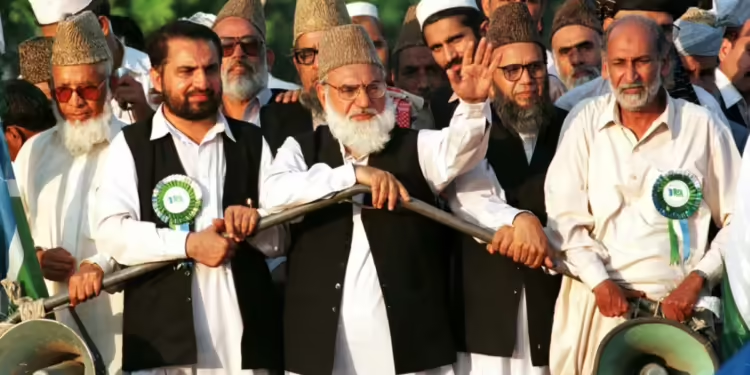The situation in Bangladesh is becoming worse day by day. The country has been highjacked by the Jamaat-e-Islami, a hardcore Islamist organization in all spheres of institutions. The Army was empowered two months back by the interim regime in the name of controlling law and order, but this was a tactic used by radical forces to get control of the Army. In the same way, the judiciary of Bangladesh has also started advocating and propagating the radical ideas of the interim government, supported and enjoyed by Jamaat. On Thursday, a special tribunal in Bangladesh banned the publication and broadcast of any speeches by former Prime Minister Sheikh Hasina, who is in exile in India after being ousted in August following mass protests.
Interim Government Moves to Silence Opposition
The decision followed Hasina’s first public speech, where she addressed supporters of her Awami League party virtually from New York. During the speech, she accused Bangladesh’s interim leader, Nobel peace laureate Muhammad Yunus, of committing genocide and failing to safeguard minorities, particularly Hindus, after her removal from power. Bangladesh is seeing its worst phase after its independence, where religious riots and religious persecution have become normal, especially Hindus and temples are being targeted, demolished and killed. The exact data of killings has not been published yet by any authorised agencies but its believed thousands have been killed and hundreds have been arrested.
For calling out the genocide and persecution of minority communities, especially Hindus in her own country, the International Crime Tribunal banned the speeches and labelled them “hate speech”. The political instability and the taking over of Jamaat as the back seat of the interim government have changed the overall scenario of a Bengali identity and have made it look like an Islamist.
The government prosecutors have requested the International Crime Tribunal to ban Hasina’s speeches on mainstream or social media. This is clearly a violation of personal liberty and freedom of speech. The country has started scraping its revolutionary legacy of 1971. The so-called student revolution in August has already seen students peeing on Sheikh Mujibur Rahman’s statues, looting undergarments from Sheikh Hasina’s residents and total chaos in the street. Bangladesh’s society has been rotten from the inside due to the increased role of Islamist ideology in every sphere of life. If a community has no gratitude towards its forefathers, who brought them out of Pakistan’s army brutality, then definitely the society has de-evolved.
Scraping Identity from Currency
Bangladesh has also initiated the removal of the country’s founding leader, Sheikh Mujibur Rahman, from its currency notes. Bangladesh Bank confirmed that it is printing new banknotes for Taka 20, 100, 500, and 1000. The new note will have pictures of the July uprising that led to the ouster of Sheikh Hasian, Bengali traditions and religious structures. It means the currency once used to be the symbol of revolution, a symbol of uprising against suppression and a voice of Bengalis as an identity in the form of Sheikh Mujibur Rahman’s picture will now be changed to the chaos of July, Islamist and radial ideologies and persecution.
The removal of Sheikh Mujibur Rahman’s picture, who was once regarded as the ‘father of the nation’ for Bangladesh, is a part of the Islamist agenda to change the real identity of Bangladeshi society and politics. The government want to scrap the incredible legacy of Sheikh Mujibur Rahman. Bangladesh has been put on the road to becoming another Pakistan in the coming years.
Irony Died a Thousand Times
The relationship between India and Bangladesh has been strained since the ouster of Sheikh Hasina. However, tension has surfaced between India and Bangladesh over incidents like the arrest/detain of prominent Hindu leaders, including Hindu monk Chinmoy Krishna Das Brahmachari.
A writ petition was filed in the High Court seeking to ban ISKCON in Bangladesh. The Bangladeshi government referred to ISKCON as a “religious fundamentalist organization.” Knowing the nature and work that the organization provide, how can a government refer ISKCON to a religious fundamentalist organization?
ISKCON’s philosophy revolves around devotion to Krishna, emphasizing practices like chanting the Hare Krishna mantra, deity worship and studying texts such as the Bhagavad-Geeta. Community living fosters shared spiritual growth while followers embrace vegetarianism, simplicity, and discipline. Beyond individual faith, ISKCON drives global initiatives, including the renowned Food for Life program for the underprivileged and educational efforts to spread its teachings, embodying spiritual purity and social responsibility. Knowing the philosophy and work of ISKCON, the petition and statement show an apparent hate towards Hindus in Bangladesh. This is what Sheikh Hasina was saying in his speeches, and got banned by labelling the speech “Hate Speech.” The irony died a thousand times here.
Bangladesh is going through its most challenging time since independence. Religious violence and attacks have become common, with Hindus being targeted, temples destroyed, and people killed. The country is at a turning point, losing its revolutionary spirit as radical Islamist influence grows. The erasure of its founding history and the silencing of minority voices are changing its identity, moving it further away from the ideals of 1971.

























